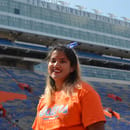Women around us are always doing remarkable things. Sometimes these things are underscored and not noticed– which really should change.
Recognition to strong, smart, remarkable women is something that should be given whenever we can.
This is why HC UFL is showcasing women in our UF community that are working to make our world better in our new series Women Who Make a Difference. In this series, we’ll learn about remarkable women and the work that they are doing.
For this edition, I interviewed Dr. Nancy Ruzycki, a Senior Lecturer and the Director for Undergraduate Laboratories for the Department of Materials Science and Engineering here at UF. She earned a $5 million dollar grant to improve K12 STEM education by integrating technology in the classrooms of 11 school districts in Florida.
What was it like growing up? Did you have any experiences that shaped who you are today?
I grew up in a family of daughters, so I never understood there were things that girls could not do. It was not until I went to school that I realized girls had limitations.
I always tried to push against the limitations that institutions placed on women. It helped that my parents supported me in these situations.
Where did you go to school? What was your experience like in school being a woman in school? How did it contribute to where you are today?
I went to public schools in Florida and graduated from USF in 1987 with a BS in chemistry and science education.
I studied Chemical Engineering for four years but decided to take a chemistry degree instead when I hit the boring chemical engineering classes in my senior year. I did not want to watch toilet paper flow through pipes, because that’s what chemical engineers basically do.
I did not go to grad school until 1997 when I was offered a master’s degree in accelerator physics at the University of Louisiana at Lafayette.
This experience made me think about going on to earn my PhD which was something I had always wanted to do but did not think I had the ability to do.
I went on to earn my PhD in solid state physics at Tulane University in three years. I had both an academic fellowship and a research fellowship. After my PhD, I did two postdocs in chemistry, one in photochemistry at Colorado State University and one at the University of Washington in Physical Chemistry.
I had wanted to work in Government labs doing research, but there were few positions which did not require another post-doc [sic] so I went to work for Seattle Public Schools as a master teacher. Then I came back to Florida to take care of my parents and took a position with the State of Florida where I was an Instructional Specialist for failing schools under the Race to the Top Grant.
In 2013, I saw a faculty position open at UF in MSE and applied for the laboratory position.
What is the EQuIPD grant?
The EQuIPD grant is a professional development grant to train teachers in 11 Florida school districts for use of sensors and probes to collect and analyze data as part of inquiry lessons to support core content development in students.
What do you envision for the grant?
I envision teachers understanding and applying technology to help students build core content models. By helping teachers develop these models in students we help them build the knowledge to succeed in STEM fields all along the pipeline.
What prompted you to apply for funding and create a program like this?
Over 25% of teachers in classrooms do not have education degrees or degrees in the field in which they teach.
This grant was written to help teachers build their STEM core content, and to deliver research/evidence based pedagogical practices in the classroom. This will strengthen the STEM pipeline for all students so we can gain more diversity in STEM fields.
What are some guiding principles you have for this program?
We use constructivist theories for model concept development coupled with systems thinking and technology to try and help teachers be more effective for students and to help students have concrete experiences in STEM from K12.
Do you have any advice for collegiate women who want to make a change in the world around them?
My advice is that it’s important for people to acknowledge what they know in terms of their strengths and also to acknowledge what you do not know, and to seek ways to gain more knowledge that you need.
I say this because I think that’s the reason I’ve been able to grow and change. I did not know materials science because I never took classes on it.
I had to admit that I did not know about the subject at all and had to be brave to learn the subject myself.
For women, we really have to persevere and help each other out. Women are often judging other women needlessly in ways that aren’t positive.
We should look out for each other, like helping each other learn, gain strength and more because we are on this road together.


